Dear Florida Climate Center Friends,
We'd like to present you with the May 2015 edition of our newsletter. In this newsletter, you'll find our monthly climate summary, a list of special events that our staff attended, some pictures, and more. If you have any questions, please email us at climate@coaps.fsu.edu.
Thanks,
The Staff of the Florida Climate Center
 |  |  | David Zierden
State Climatologist | James O'Brien
Professor Emeritus | Melissa Griffin
Asst. State Climatologist |
|
April Climate Summary for Florida
The Florida Climate Center's April 2015 Florida Climate Summary is now available. The summary provides an analysis of temperature and precipitation trends across the state, along with data on hazardous weather, drought, the impacts of the weather and any records tied or broken for the month. During April, average temperatures were well above normal and rainfall totals were above normal for most of Florida. ENSO-neutral conditions are continuing in the equatorial Pacific. The Climate Prediction Center (CPC) predicts above normal temperatures and precipitation for the state through July 2015. Past summaries are archived here.
| April average temperatures and departures from normal (°F) for select cities. | 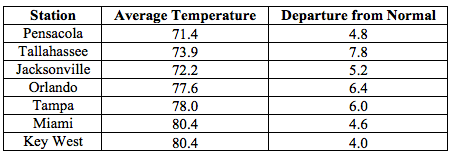 |
| April precipitation totals and departures from normal (inches) for select cities. | 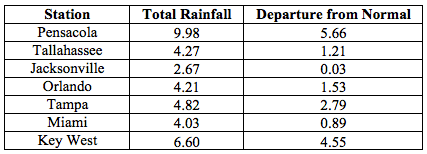 |
| A graphical depiction of the monthly rainfall departure from normal (inches) for April (courtesy of NOAA, NWS). | 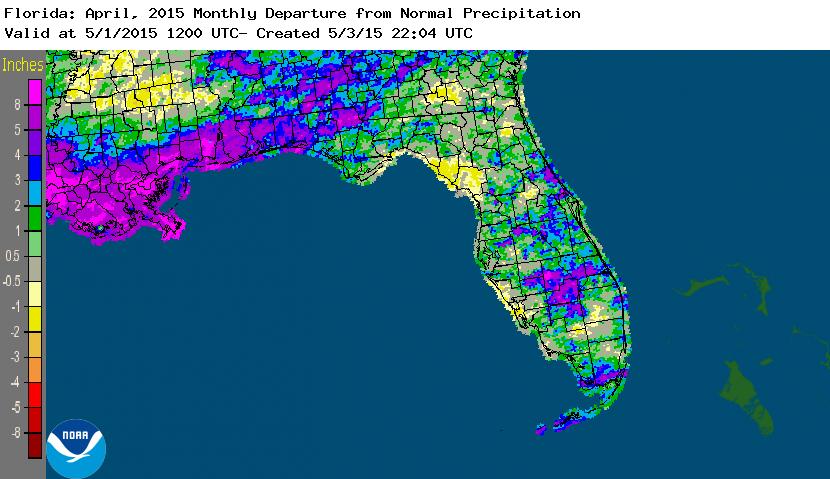 |
|
|
State Climatologist from around the Southeast Meet with SERCC
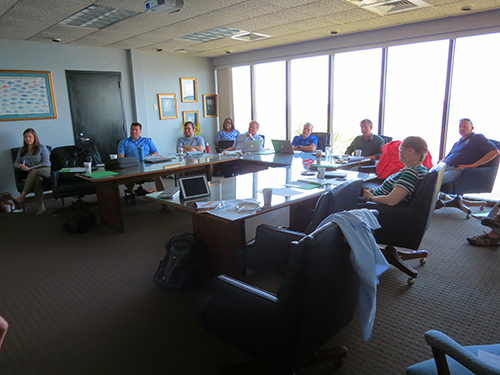 The Southeast Regional Climate Center (SERCC), based in Chapel Hill, NC, hosted the annual meeting of their technical advisory committee. The meeting was held at Folly Beach, SC and the local host was Hope Mizzell, South Carolina State Climatologist with the state Department of Natural Resources. The group meets every year to discuss the products and services provided by the SERCC and how they can enhance the services of the State Climatologists. This is also an opportunity for all the offices to share information about current activities and possible collaborations in the future. A special guest at this year's meeting was Lisa Foulabdash with USDA's Southeast Regional Climate Hub. Lisa is eager to create practical working relationships between agricultural stakeholders in the Southeast, the SERCC, and State Climatologists. The Southeast Regional Climate Center (SERCC), based in Chapel Hill, NC, hosted the annual meeting of their technical advisory committee. The meeting was held at Folly Beach, SC and the local host was Hope Mizzell, South Carolina State Climatologist with the state Department of Natural Resources. The group meets every year to discuss the products and services provided by the SERCC and how they can enhance the services of the State Climatologists. This is also an opportunity for all the offices to share information about current activities and possible collaborations in the future. A special guest at this year's meeting was Lisa Foulabdash with USDA's Southeast Regional Climate Hub. Lisa is eager to create practical working relationships between agricultural stakeholders in the Southeast, the SERCC, and State Climatologists.
|
|
Community Outreach Activities
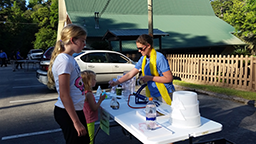 Assistant State Climatologist Melissa Griffin spent time in local area elementary and middle schools, presenting information on weather and climate. In addition to the school presentations, she took part in the School of Arts and Sciences' Science Night, an outdoor educational experience for parents and students that highlighted a variety of different fields of science. Assistant State Climatologist Melissa Griffin spent time in local area elementary and middle schools, presenting information on weather and climate. In addition to the school presentations, she took part in the School of Arts and Sciences' Science Night, an outdoor educational experience for parents and students that highlighted a variety of different fields of science.
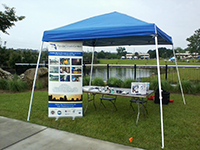 Tallahassee hosted an Earth Day Celebration at the new downtown Cascades Park on April 25th. Exhibitors set up tents and displays around the lake with the theme of protecting the global environment. State Climatologist David Zierden was at the Florida Climate Center's booth, talking about climate and the environment, promoting CoCoRaHS, and performing some simple demonstrations. Unfortunately, lightning and weather warnings cut the celebration short around mid-day. Tallahassee hosted an Earth Day Celebration at the new downtown Cascades Park on April 25th. Exhibitors set up tents and displays around the lake with the theme of protecting the global environment. State Climatologist David Zierden was at the Florida Climate Center's booth, talking about climate and the environment, promoting CoCoRaHS, and performing some simple demonstrations. Unfortunately, lightning and weather warnings cut the celebration short around mid-day.
|
|
Special Report: El Niņo Strengthens for Another Round, Spring Rains, and Potential Summer Dryness
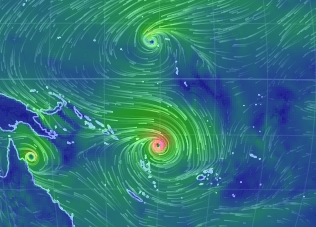 Similar to last year, we have watched another round of westerly wind events in the western Pacific since January. The topper was one of the most impressive westerly wind events on record in March, punctuated by an unusually strong Madden-Julian Oscillation (MJO) and a pair of tropical cyclones. These westerly wind events have triggered another monster Kelvin wave similar to the one that kicked things off last year. A little over a month ago the only warm surface waters were confined to the central Pacific as El Niņo weakened. Now, warm waters have appeared along the coast of South America and El Niņo has taken on the classic configuration. The resurgent El Niņo was at least partly to blame for the rainy month of April in Florida, but may also lead to late summer dryness. Read more here: El Niņo Discussion Similar to last year, we have watched another round of westerly wind events in the western Pacific since January. The topper was one of the most impressive westerly wind events on record in March, punctuated by an unusually strong Madden-Julian Oscillation (MJO) and a pair of tropical cyclones. These westerly wind events have triggered another monster Kelvin wave similar to the one that kicked things off last year. A little over a month ago the only warm surface waters were confined to the central Pacific as El Niņo weakened. Now, warm waters have appeared along the coast of South America and El Niņo has taken on the classic configuration. The resurgent El Niņo was at least partly to blame for the rainy month of April in Florida, but may also lead to late summer dryness. Read more here: El Niņo Discussion
|
|
Upcoming Events
May 11-12, 2015:
NIFA/USDA Organizational Project Meeting in Quincy, FL
May 15, 2015:
Tri-State 4-H Training Workshop in Macon, GA
June 23-26, 2015:
Annual Meeting of the American Association of State Climatologists in Cape May, NJ
|
|
About Us
The Florida Climate Center is part of a three-tiered system of national, regional, and state climate offices, including NOAA's National Climatic Data Center and the Southeast Regional Climate Center. The Florida State Climatologist and other staff at the Florida Climate Center provide the following information and services to the people of Florida:
· Climate Data:
Historical weather observations for weather stations throughout the state of Florida. We are able to provide data for most stations from 1948-present.
· Climate Information:
Long-term historical averages for various stations, climate divisions, and the entire state.
· Extreme Event Records:
Information and analyses on extreme events such as freezes, droughts, floods and hurricanes.
· Special Analysis:
With their vast knowledge of El Niņo, La Niņa and climate variability, the State Climatologist and staff can offer expert insight into Florida's climate trends.
· Outreach:
Activities, presentations, and workshops that inform and educate the people of Florida about current and emerging climate issues. We also coordinate volunteers for the Community Collaborative Rain, Hail & Snow Network (CoCoRaHS).
More About Us
|
|